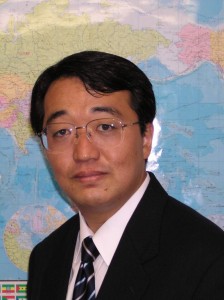緊張と統合:内村鑑三におけるキリスト教と日本の精神
このシリーズでは、私が1994年に執筆した統一神学大学院(Unification Theological Seminary)の神学課程修士論文(Divinity Thesis)を日英二か国語で掲載している。
4.日本文化とキリスト教の統合の続き
儒教においては、誠実さは自己完成に至る資質である。誠の人とは、努力することなく何が正しいかを思いつき、思考を働かせることなく理解する人であり、彼は道を体現した賢者なのである。武士道の内容を構成している一般的な徳目である質素、忠誠、孝行、勇気、冷静沈着、仁などは、すべて基本的に『誠』の態度を中心としており、それは『誠』が神道、禅、および儒教の倫理が互いに影響しあって形成されてきたことに起因している。
真理の精神によって自分の状況に向かって行く個人のみが、彼の置かれている状況に最もふさわしい道徳的判断を下すことができる。『誠』は個人的真理と個人的道徳の基準であり、真の自己の精神的力を引き出すものであるがゆえに、本質的に創造性を持っている。あらかじめ定義され、「絶対的」権威をもった抽象的基準というものは、日本人にとっては考えられないことであり、自分の自由と尊厳を奪われるように感じられるがゆえに、不快なことでさえある。結果的に日本人の道徳は、極めて状況的で個別主義的なものとなる。それは今、目の前にある問題にのみ集中しており、その人の個人的な正義観と強い感情的な結びつきがある。
日本の宗教伝統においては、現実に対する根本的な態度の中に、明かな連続性が存在する。それは神道から仏教へと無意識的に流れて来たものが、都合よく儒教の精神と混じりあって、明確な定義や体系的な公式がなくとも自然と心から沸き上がってくる道徳となったのである。このような精神伝統の一般的枠組みの中において見たとき、はじめて無教会キリスト教の特徴は意味あるものとなるのである。
ある意味で、無教会はキリスト教の神秘主義的伝統に属している。しかしその神秘主義的アプローチは、西洋からの借りものではない。彼らの神秘主義は紛れもなく土着のものであり、それは現実に対する彼らの伝統的なアプローチ、特に禅宗のアプローチを適応することに由来するものである。心理学的なプロセスという観点からみれば、禅とキリスト教神秘主義は極めて似ている。双方とも心の深層における精神集中の過程、主観と客体を越えた悟り、経験主義的な自己の喪失を必要とする。また双方とも心理的な完全性と一体性の体験を促進し、その過程を体験した個人を完全に変容させ、「回心」させるのである。
このような禅とキリスト教の統合は可能である。何故なら現実に対するアプローチの方法としての禅は、いかなる定義や公式にも限定されないからである。その性質からして、禅は仏教あるいはその他のいかなる「主義」にも傾倒するものではない。無教会は、その自発的なキリスト教の理解において、日本文化に実に深く根ざした禅の精神をもってキリスト教に近づき、真に神秘的な味わいを持った土着のキリスト教を作り出したのである。
カルロ・カルダローラは、西洋人は進歩主義における理性に対する失望の結果として、近世においてのみ実存主義的になったのに対して、日本人は伝統的に心からの実存主義者であったと主張する。この独特の実存主義的文化の中においては、合理的要素は、二次的な役割しか持たなかった。日本人は究極的実在との実存主義的な出会いに関心を持っていたのである。したがって日本人の宗教性は本質的に非合理的であり、それ故に概念化することが出来ない。宗教的真理は、如何なる組織や口伝伝承や文書の中にあるのでもなく、深い感情的体験の中に存在しているのである。
キリスト教を受け入れようとする日本人は、その心の本質的な特徴として実存主義的な枠組みを持っているために、その実存主義的基礎の上にそれを受けとめる準備がなされているのである。彼にとって信仰とは、超越者と無条件に結びついた自己を直接体験することである。したがってキリスト者としての体験も、必ずしも特定の教会の一員となることや、特定の信条、教義、儀式、あるいは宗教的官僚主義を受け入れることとは関係がないのである。この様な態度が、日本の無教会運動の核心部分を形成しているのである。
IV. Synthesis of Japanese Culture and Christianity(Cont.)
In Confucianism sincerity is the quality by which one reaches self-perfection. The sincere man is he who, without effort, hits on what is right and apprehends without the exercise of thought; he is the wise man who embodies the way. The familiar virtues of frugality, loyalty, and filial piety, courage, self-possession, and benevolence, which form the content of Bushido, are all centered in the basic attitude of makoto as it has been shaped through the combined influence of Shinto, Zen, and Confucian ethic.(31)
Only the individual who faces his situation in a spirit of truth is able to make the moral judgment that best fits his case. Makoto is the standard of both personal truth and personal morality; it is essentially creative, for it brings out the spiritual powers of real self. Any predefined and abstract standard carrying “absolute” authority is unthinkable and even irritating to the Japanese who feels that he has been deprived of his freedom and his dignity. Consequently, the morality of the Japanese is strictly situational and particularistic; it concentrates only on the problem at hand and includes a strong emotional commitment to one’s personal rectitude.(32)
In Japanese religious tradition, there is clear evidence of continuity in the fundamental attitude toward reality subconsciously running from Shinto through Buddhism and conveniently blending with the Confucian spirit into a practical code of ethic (dotoku) which springs up naturally from the heart without either precise definition or systematic formulation. It is only in the general framework of this spiritual tradition that the characteristic features of the Mukyokai Christianity become meaningful.(33)
In a sense, the Mukyokai is substantially in the Christian mystical tradition; however, they did not borrow their mystical approach from the West. Their mysticism is strictly indigenous, and it derives from an application of their traditional approach to reality, particularly the Zen approach. In the matter of the psychological process, Zen and Christian mysticism are quite similar. Both require some kind of in-depth process of concentration, enlightenment beyond subject and object, and loss of the empirical ego; both promote an experience of psychic wholeness and unification, which results in a complete transformation or “conversion” of the person involved.(34)
This synthesis of Zen and Christianity is possible because Zen, as a way of approaching reality, is not limited by any definition or formality. By its nature, Zen is not committed to Buddhism, nor to any other “ism.” The Mukyokai, in their spontaneous grasp of Christianity, have approached it with the spirit of Zen, so deeply embedded in Japanese culture, and have produced an indigenous kind of Christianity with a genuinely mystical flavor.(35)
Carlo Caldarola asserts that the Japanese have traditionally been existentialist at heart, whereas western man became existential only in the modern era and as a result of progressive disappointment with reason. Within this unique existential culture, rational elements occupy only a secondary role. The Japanese are interested in an existential encounter with the ultimate reality; so, the religiosity of the Japanese is by its nature irrational, and as such, not subject to conceptualization. The locus of religious truth is not found in any body of oral or written traditions but in a deep emotional experience.(36)
With this existential framework as an essential feature of his mind, a Japanese who wishes to embrace Christianity is prepared to do so on this existential basis. For him faith is a direct experience of the self unconditionally related to the transcendent; therefore, a Christian existence is not necessarily connected with being a member of a particular church or with accepting certain creeds, dogmas, rituals, or religious bureaucracy. These attitudes form the core of the Japanese non-church movement.(37)
(31)Ibid., p.87.
(32)Ibid., p.88.
(33)Ibid., p.87.
(34)Ibid., p.96-7.
(35)Ibid., p.97.
(36)Ibid., p.214.
(37)Ibid., p.216.
